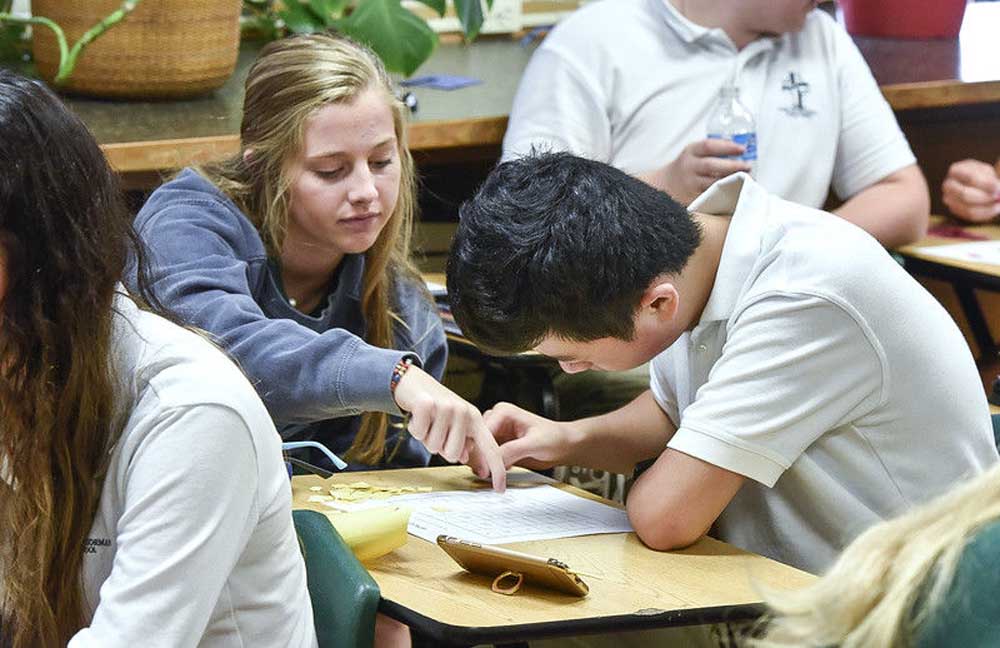International students, host families learn each other’s culture
Published 3:04 pm Wednesday, September 28, 2016

- Elise Pritchard, left, helps Qingshi "Bob" Chen find the correct answer on a Bingo sheet during a game in theology class Sept. 12 at Bishop T.K. Gorman High School in Tyler. Native students are helping the foreign exchange counterparts as they adapt to attending school in East Texas. Andrew D. Brosig/Tyler Morning Telegraph via AP
BETTY WATERS
blw@tylerpaper.com
A teen-aged boy from South Korea and a girl from China are residing in the home of Tylerites Emily and Craig Ashton.
They are among a growing number of high school international students hosted by Tyler families while they attend Gorman Regional Catholic School.
For the students and families, the arrangement has proven mutually beneficial.
Xinyi Li, 15, a sophomore from China, who has chosen Cindy for her American name, is settling into her first year in this country.
“I came here first to receive a better education,” she said. Secondly, she later wants to go to an American college and theorized that getting to know, in high school, how teachers teach students here would be good preparation for college.
Talking with friends at school about things she didn’t know before is interesting, she said.
By the time Hun Kong, 18, a senior from South Korea, graduates in May, he will have attended Gorman two and a half years and lived with three different Tyler families.
“I came here to study abroad and to understand the culture and make foreign friends and improve my ability to speak English,” he said. “America has a really different educational system. It is better than in South Korea. I really like the American education system.”
Kong plans to attend college in America to study law enforcement and to stay in this country.
Both students said they picked Gorman because it is rated as one of the top 50 Catholic high schools. They added they have found Gorman teachers and students are “good” to foreign students.
Kong likes to swim at Lake Tyler and to play soccer and baseball at Gorman. Li has joined the biology club and a social activity club.
Living with an American family is different from a Chinese family, Li said. “I think it’s very interesting. They are all very kind to me and they are very friendly. Sometimes I don’t know how to say things and they help out,” she said.
Her parents in China are doctors, very busy and usually not at home, Li said, while her host family in America is bigger with relatives often coming in. Similarly, Kong also has noticed a lot of family members of his host family, such as their nieces, coming to the house, while in Korea, family members live far apart and do not come much.
The biggest difference between her China family and American host family is the food, Li said. “I like food from both countries,” she said.
Kong said he likes being part of an American family and American foods, his favorite being a hamburger.
Host families are exposed to the foreign food of the international students who sometimes cook. Kong plans to prepare Korean barbecue for the Ashtons. Li has prepared a Chinese meal for them.
When the students arrived, the Ashtons welcomed them, assured them that the house was the students’ home and encouraged them to ask any questions.
House rules require the students to do chores, such as take care of their room, keep their bathroom clean and do their homework. The students would help with sweeping and mopping, Mrs. Ashton said, but she tries to give them as much time as possible to pursue their primary goal of studying.
“As we go through the day, it gives us an opportunity to visit the culture (of the foreign students) without getting on a plane,” Mrs. Ashton said. “I like learning the differences in culture and the differences in food.”
The students lived in tall apartment buildings in South Korea and China and were struck by how spread out and big houses are here.
On a typical day, Mrs. Ashton makes sack lunches for the students before taking them to school. After school, she or her husband pick them up, they get started on their homework, the family gathers for dinner, talks and watches television.
Long conversations ensue over dinner about how the students’ day at school went and differences in culture and politics. For instance, in China, instead of high school students changing classes, teachers change classrooms. While American students have many class choices, Chinese students do not.
The foreign students are unaccustomed to having sports in school.
They are very diligent about their studies. “I wish I could have studied like they do when I was in school,” Ashton said. His wife added, “You don’t have to fight with them to get them to do their school work and they are very respectful.”
In talking about politics and cultural differences with the students, Ashton discusses the way the governmental systems are set up, the way social media have a tendency to influence the political process and what the students may be used to in their country.
“Human interaction is mostly what we are looking for (in conversations),” he said. “We have our cultural differences, but we can discover more of each through that simple exchange.”
Ashton has noticed in talking with the international students that America is more culturally diverse from the standpoint of there being more opportunity for individuals.
The couple includes the youngsters on family outings and events, such as a wedding, and takes them to eat out and to the grocery store to give them the cultural experience of being out in the community.
“We like to take in and love on people. I get to take care of them and they are very appreciative,” Mrs. Ashton said. Hosting the foreign students exposes the couple to new experiences, diversity and new foods. It also lets her nieces see how to treat people they are not familiar with, she said.
“I like to see the students have the opportunity to come here and learn,” Ashton said. “We are glad to have them and look forward to participating in the program more.”
Most of the international students attending Gorman come through an agency in the U.S. called Private School Exchange, although some come directly from their homeland or through other avenues. Besides China and South Korea, they have come through the years from the Dominican Republic, Taiwan, Vietnam, Germany, Spain and different countries in Africa.
Only one or two came per school year about 14 years ago, but the number of international students has increased in the last three or four years to more than 20.
They bring to Gorman “a different perspective of the world and they have a different perspective of community and family. They enrich our community,” Jane Manley, director of student services, said.
“They have their own unique sense of humor that we learn. They are very independent ‑ not as a way of going against the tide but as a way of swimming with the tide yet keeping your own identity,” she said. “They take on the rules and expectations of the families they live with. At the same time, they are very capable of taking care of themselves. I think that spreads to other students.”
Manley and her husband have three students living in their home for the second year. “They are another member of your family; they are not a boarder,” she said, noting there is a stipend from the agency to help with the cost of feeding the students and other expenses.
It is a cultural exchange, said Manley, who learned from students how to make Chinese dumplings. “A lot of the students are really good cooks, male and female,” she said.
“I like the different foods that we eat and we have very lively discussions,” Manley said.”It’s been a wonderful experience for my family.”
Anyone interested in hosting an international student attending Gorman may contact Mrs. Ashton, who is one of two local coordinators for Private School Exchange, as well as she and her husband being a host family. She can be reached at
lcemily@outlook.com or 903-312-0312.
Twitter: @Betty_TMT






